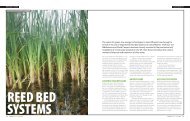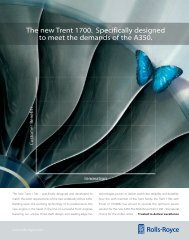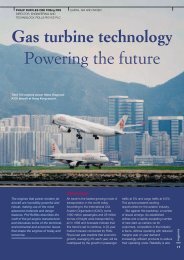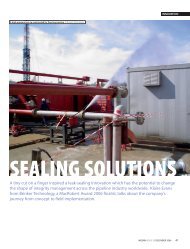Shipping safety - Ingenia
Shipping safety - Ingenia
Shipping safety - Ingenia
Create successful ePaper yourself
Turn your PDF publications into a flip-book with our unique Google optimized e-Paper software.
MARINE MATTERS<br />
Air travel may be the fastest<br />
growing transport mode<br />
(<strong>Ingenia</strong>, August 2001, Issue 9)<br />
but in terms of cost per tonne mile<br />
shipping at about £0.25 per tonne mile<br />
is an order of magnitude more efficient<br />
than road transport and two orders<br />
more efficient than air freight. Ships<br />
therefore continue to carry around 95%<br />
of international freight, compared with<br />
about 0.5% for air freight. It follows<br />
that shipping remains the most<br />
important transport mode for the<br />
world’s economic and social wellbeing.<br />
Future demands from the developing<br />
countries will place an increasing load<br />
on shipping, which is a slow and<br />
reactive industry. Even today, real<br />
technical and human issues of ship<br />
<strong>safety</strong> exist, which are not being<br />
adequately addressed. This article<br />
briefly reviews the present position and<br />
possible future scenarios for<br />
improvement.<br />
Indicative shipping data and<br />
projected growth<br />
Available statistics on ships (and ship<br />
<strong>safety</strong>) can vary significantly, hence the<br />
first adjective above. Table 1 is derived<br />
mainly from the British Chamber of<br />
<strong>Shipping</strong> data for the world fleet and<br />
from the widely used Fearnleys’ Annual<br />
Review 2001 for sea borne trade.<br />
Values for the year 2000 have been<br />
collectively adjusted into three cargo<br />
and ship types, hopefully to make the<br />
data more understandable.<br />
From Table 1 we see that the dry<br />
and liquid bulk carrying ships, the ‘work<br />
horses’ of the sea, make up 40% of the<br />
trading fleet but carry 66% of world<br />
trade, which reflects their greater ship<br />
size dictated by the economies of<br />
scale. Manufactured goods are said to<br />
represent nearly 20% of world trade.<br />
Not seen in Table 1 is the average ship<br />
journey of about 4,500 miles; and the<br />
UK owned fleet is about 1.5% of the<br />
total but it carries about 4.5% of world<br />
freight – a pale shadow of its former<br />
glory, mainly due to successive UK<br />
governments’ lack of commitment to<br />
UK shipping.<br />
Between 1982 and 2000 world trade<br />
increased by 2.8% per annum. A 2000<br />
projection suggested that world trade<br />
would double in the next 12 years,<br />
which is equivalent to about 6% p.a.<br />
growth. Some may regard this as<br />
unlikely, but there is little doubt that the<br />
increasing demands and trade from<br />
China and the more rapidly developing<br />
countries will provide an engine for<br />
increased shipping growth, and this at<br />
a time when the world fleet is getting<br />
steadily older and standards of<br />
maintenance and training are declining.<br />
Such growth implies a need for more<br />
ships, berths, trained seamen, etc. This<br />
will have adverse effects on shipping<br />
<strong>safety</strong> unless standards improve.<br />
Table 1: Cargo ships and types, ship numbers and tonnes carried in 2000<br />
Ship Cargo Ship Ship Million Trade<br />
category type type numbers tonnes %<br />
Dry bulk iron ore, coal, grain bauxite and bulk carriers 5,775 1,288 24<br />
aluminium, phosphates, etc. (see Fig. 1)<br />
Liquid bulk oil and oil products oil tankers 8,415 2,027<br />
(energy liquid gas LG carriers 1,147<br />
}<br />
carriers) chemicals chemical tankers 1,285 280<br />
other products product tankers 348<br />
11,195 2,307 42<br />
General other dry cargoes, container 2,734<br />
cargo manufactured goods, general cargo 16,520<br />
special products, refrigerated 1,409<br />
food, etc. ro–ro cargo † 898<br />
ro–pax passenger § 2,569<br />
specialised trade 1,536<br />
25,666 1,839 34<br />
Grand totals of trading ships and cargo 42,636* 5,434 100<br />
ingenia<br />
* This figure excludes 2,460 passenger ships, 324 cruise ships and 43,220 other non-trading specialist ships.<br />
†<br />
roll-on/roll-off cargo<br />
§<br />
roll-on/roll-off ship for passengers and cars only<br />
14








![[322/03] Francke - Ingenia](https://img.yumpu.com/23411337/1/184x260/322-03-francke-ingenia.jpg?quality=85)







